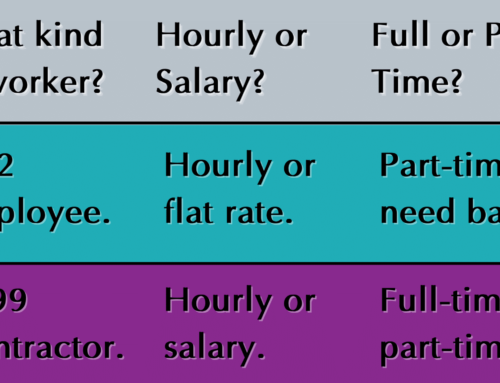Educational Video
Corporations – What are they good for? At this point in time, they have their purpose, but for most small businesses, they’re not good. The reason is because of the way our current tax code is set up. Corporations suffer from what we call double taxation, which means the income that a corporation makes, its net income, so its expenses after whatever revenue generates, is subject to income tax. If you’re one of the owners of that corporation, you’re going to want to take money out of that business. So, you need to either put yourself on payroll where you’re going to be paying taxes and the company is going to be paying taxes, or you need to pull out dividends where you’re going to be paying taxes and the company is going to be paying taxes as well. There’s just a lot of tax going on.
Also, the rates for C corporations are pretty steep. You might hit a much higher tax bracket quicker, and by quicker, I mean by the amount of net income the company’s earning on a C corp verse setting it up as an S corp and letting it get taxed at the personal level where your rates at the same income level are going to be lower.
But C corporations do have some specific purposes. I work with a lot of technology startups, and a lot of times those companies will take on investors. Well, if you’re taking investors and you’re taking investor money, you’re probably going to need to be a C corp. The reason for that is those investors might not want to get a K1 from your business that’s showing losses. If it’s showing profit, they might also not want those K1s. This allows them to own a piece of your business and to give it a cash infusion without needing to deal with the tax consequences on their personal return.
They also might not be eligible to be a different form. So, if somebody’s got an investment group that’s an LLC, and you’ve set up as an S corporation, well, now you’re not able to be an S corporation anymore. There’s some strategies that you have to think about and some technical issues you need to think about if you’re planning on taking investor income. Usually, it leads to the company being a C corporation.
C corporations are also useful for foreign owners of the business. Foreign owners cannot be owners of S corporations, so that eliminates that option. If you’re not wanting to pay American taxes and get into that whole tricky situation, if you’re not living here, then a C corp is probably one of the better ways to handle that.
Now, sometimes you might see if you go, say, to doctor’s office, it might have a PA or PC at the end. This stands for professional association and professional corporation. These are actually types of C corporations. Originally, it was thought, well, a doctor or a lawyer shouldn’t be able to hide behind a corporate shell. If you were in trouble for malpractice, you shouldn’t be able to separate yourself from the business. It was felt that the corporation was letting people do just that. Over the years and decades, those rules have changed, but we still have the PA and the PC structures available. These are only available to what’s generally a licensed professional by the state. So, your doctors, lawyers, dentists, CPAs, engineers, these types of professions can form these organizations.
Now, the reason that it’s a little tricky is, a PA or a PC is actually subject to a flat 35% tax rate. Whether you have net income of a dollar or a million dollars, you would pay 35%, which is pretty steep. It’s one of the highest tax rates that we have in the US. What ends up happening is, when people form a PA or a PC, they actually make an S election, effectively turning it into an S corporation and taking all of advantage of the benefits of an S corporation. The C corporation, not great for small business, unless you have some specific situations, you’re a tech startup, you’re a foreigner trying to operate a company in the US. Even if you’re professional setting up your own practice, probably still going to become an S corporation.







